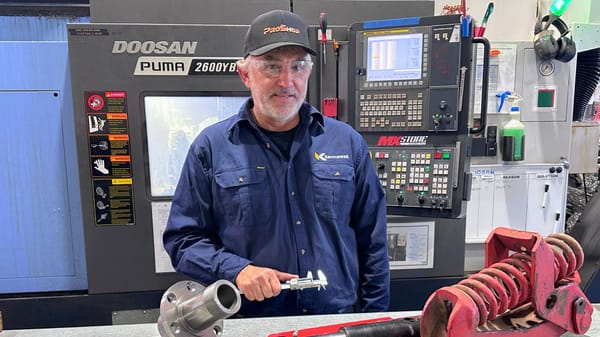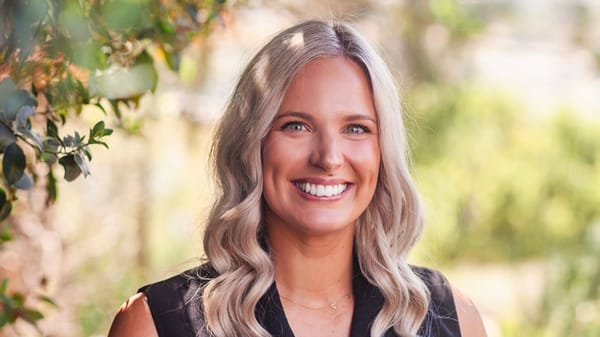Thirty-four CFS volunteers awarded medals for Black Summer service
Members of the SA Country Fire Service’s Swanport Group have received the National Emergency Medal for their efforts in the summer of 2019-20.

This post was originally published behind Murray Bridge News’ paywall. Paywalled posts are unlocked four weeks after publication. Can’t wait that long? Subscribe here.

Paul McArdle had only been a Country Fire Service volunteer for about three years when the call came through.
The bushfires in Victoria’s high country had got pretty bad, people there were afraid, and authorities there had put the call out for reinforcements from South Australia.
He didn’t hesitate to put his hand up.
Mr McArdle recalled that confronting summer on Sunday, as he and 33 other volunteers from the SA CFS’ Swanport Group were awarded the National Emergency Medal.
A seven-day deployment wound up being just the first of three the Monarto CFS member would serve interstate during the so-called Black Summer of 2019-20.
He spent another five days fighting an “uncontrollable” fire in the Snowy Mountains of New South Wales, and later five more helping locals sift through the wreckage of their homes in Queensland.
“In New South Wales and Queensland it was a pretty intense fire … moving through forest, with no hope of stopping it and spot fires appearing several kilometres ahead of the front,” he said.
“Because it was so dry up there we had to fight it with minimal water, too.
“In Queensland … there were entire suburbs destroyed, entire streets up in the hills and nothing left.”
There was no rest waiting for him back in South Australia, either – he spent time fighting the Port Lincoln, Cudlee Creek and Kangaroo Island fires as well.
Meanwhile his partner Kyra Smith was back at home, worrying at the photos he texted through.
Still, she preferred him to be away helping, she said, even if it meant he’d be in harm’s way.
“I’d want people to show up if it was our place,” she said.
Travelling from crisis to crisis left him feeling helpless at times, Mr McArdle admitted.
But everywhere he showed up in uniform, people were grateful.
“There’s a great sense of pride … that you can help your community, and other communities in Australia,” he said.
“You feel grateful that you’ve gone and helped them, given some time out of your life to go and help those ones you see on the news.”

On Sunday at Murray Bridge Golf Club, a grateful nation recognised the service of 34 volunteers from the CFS’ Swanport Group, and more from the Coorong and Ridley groups, by awarding them the National Emergency Medal.
The medal was created in the wake of the Black Saturday fires of 2009 to recognise people who had rendered “sustained or significant” service during a nationally significant emergency.
Those recognised from local CFS brigades included:
- Callington: Michael Bettens
- Ettrick: Brad Erickson
- Jervois: Timothy Light, Mark Turner, Lincoln Williss
- Mannum: Matthew Freak, Jeremy Strauss, Shaun Tidswell, Jordan Turpin
- Monarto: Robert Barkley, Timothy Champion, Barrie Gale, Joshua and Tracey Gilding, John Jackson, Paul McArdle, Christina Stephenson, Kylie Wurst
- Murray Bridge: Samuel Baldwin, Haylee Campbell, Scott Carter, Zachary Forrester, Steven Harvey, Darren Hollitt, Robert Kay, Aaron Reynolds
- Mypolonga: Stephen Hein
- Rockleigh: Donald Moore, Marcus Truman, Joshua Walker
- Swanport group: David Millan
- Tailem Bend: Devlin Aggett, Clinton Reese, Dylan Robertson, Derek Sheldon

CFS regional operations manager Chris Bastian thanked the firefighters for their service, and their families and employers for their support.
“Share the medal with the recipient,” he said.
“You’ve earned it as much as they have.”
The Black Summer fires are estimated to have burned more than 24 million hectares across Australia, killing 34 people, contributed to the deaths of almost 450 more through smoke inhalation, destroying thousands of homes and causing billions of dollars worth of property damage.
Such summers are likely to become more common unless more is done to slow down the effects of climate change, CSIRO researchers have said.






